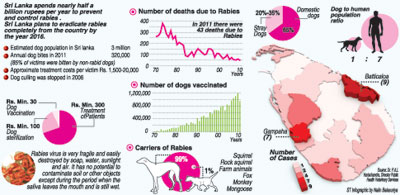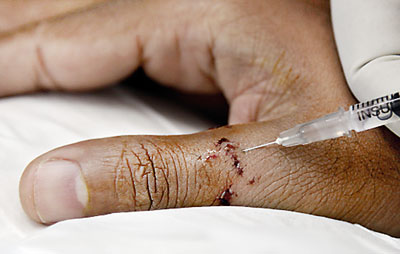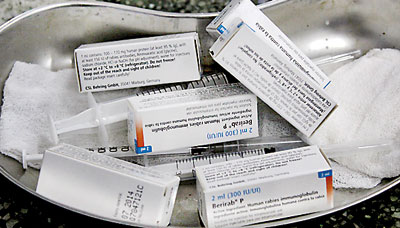Rabies was back in the news with the Health Minister Maithripala Sirisena last week creating an uproar, especially among animal lovers and animal rights activists when he said Sri Lanka had decided to lift a moratorium on killing of stray dogs as the government attempted to tackle the problem of 2,000 people being admitted daily to hospital after being bitten.
 |
 |
 |
| Sagarika Karunanayake |
Dr. P.A. Harischandra |
Dr. Gunasekare |
The law here allows authorities to catch and kill stray animals, but a presidential order stopped the practice in 2006 following lobbying by animal rights groups.
The health minister said the stray dog population was currently three million and was increasing rapidly due to poor sterilization programmes in some areas of the country.
However, in the face of concerns raised by animal rights activists the Minister said the ministry will issue orders to health officials in local authorities to control the stray dog population through sterilizing programmes.
“Rupees one billion has been allocated for rabies control this year. A survey will be conducted and all dogs that have owners will be given collars. Not a single dog will be killed but a wide sterilization programme will take place with the help of the private sector,” he said.
Against this backdrop, health officials have warned that “community dogs” or dogs loitering in public places are the latest addition to the country’s dog population, contributing to the increasing number of rabies cases.
The 1893 law of culling stray dogs has brought no results. The only
viable method is scientific and humane dog population
control and
vaccination.” - Sagarika Karunanayake |
| We have attended to patients who have been bitten while at school, at police stations and temples.” - Dr. Gunasekare |
Dr. Amila Gunasekare, Medical Officer in Charge of National Hospital’s Anti-Rabies Unit said apart from roaming/stray dogs and domesticated dogs, there has been an increase in the number of attacks from community dogs which shelter in public places.
“People dump unwanted pups in the premises of temples, hospitals, schools, police stations and other public areas. The dogs are fed but only a few bother to sterilize or neuter them. This is a growing menace,” he said.
Emphasizing the problem, he said a number of inmates at the Angoda Mental Hospital had received treatment after being bitten by dogs dumped in the hospital premises. “We have attended to patients who have been bitten while at school, at police stations and temples,” Dr. Gunasekare said.
Rabies is a viral disease that is transmitted from the saliva of any mammal, but mainly through dog bites. It is invariably fatal in both humans and mammals. It is reported worldwide that approximately 45% of rabies deaths occur in Asia, with dog bites accounting for 96% of human rabies cases worldwide.
The virus in general spreads through bites, scratches and licking of mucus membrane or an open wound. In Sri Lanka, the majority of the cases are from dog bites followed by cat bites/scratches.
Currently, Sri Lanka’s ratio of dogs to human population is 1:6.
According to officials, in 2011, the Government spent Rs. 300 million on treating rabies victims, Rs. 30 million on Rabies vaccines and Rs. 100 million on the sterilization/neuter of dogs.
A patient who is infected is given the Anti-Rabies Vaccine (ARV) and those with severe bites are given both the vaccine and serum, human rabies immunoglobin (human blood serum) or horse blood serum.
The human blood serum mainly imported from Germany costs Rs. around Rs. 6,000- 7,000 per vial while the imported horse serum from India is between Rs. 1500-Rs.2000 but sometimes cause allergic reactions, the Sunday Times learns.
About 100,000 anti-rabies serum vials are imported from Germany, France and India.
On average a person needs at least four or five vials of human blood serum as against only two vials of horse serum for the treatment of a bite, the Sunday Times also learns.
“Sri Lanka is the only country that gives anti-rabies medicines free. Because of the high cost we first try to treat with horse serum. If the patient suffers from allergic reactions he/she is given anti-histamines and later treated with human blood serum. Those who do not want to go through this process can purchase the human rabies immunoglobin from outside,” he said. A patient who was being treated at the Rabies Unit told the Sunday Times he had to spend upto Rs. 36,000 to purchase six vials, with one costing Rs. 6,000.
Commenting on the disease, Dr. Gunasekare said the points from which the virus enters the body most rapidly are through nerve-rich areas like fingertips, face and lips.
Meanwhile, Public Health Veterinary Services Director Dr. P.A. Harischandra said 1500 dog bites are reported daily in Sri Lanka.
“Last year 320,000 dog bites were reported and 43 persons died of rabies. The government spent Rs. 300 million on anti-rabies treatment. Vaccinating is done mostly by the private sector and about Rs. 800 is spent on one dog,” he said.
 |
| “Community dogs” dumped in public places have become a problem. |
 |
 |
| A victim of a dog bite being attended to |
 |
| Anti rabies vaccination dose needed for one person. Pix by M.A. Pushpa Kumara |
“The main reason for the increase in rabies is irresponsible pet ownership. Owners of pets should make sure that their pets are well taken care of,” he said.
According to official statistics, Gampaha and Galle districts have recorded the highest number of rabies cases.
Dr. Chamith Nanayakara of the Association of Veterinarians for Humane Management of Animal Population said out of about 2000 bites reported daily, 80% are dog bites while the rest are from other animals like cats, monkeys and squirrels.
“At present only 40 percent of the dog population is vaccinated. The National Dog Population Sterilization Programme launched in 2008 was a success only in North- western, Sabaragamuwa, Central and North-central provinces. This programme should be properly implemented in all parts of the country, especially where the human population density is high,” he said.
He also added that laws should be introduced so that action could be taken against persons who abandon pups on the streets and those who raise pets in a careless manner.
Sagarika Rajakarunanayake, president of ‘Satva Mithra’, an animal welfare organization said sterilization programmes conducted by the government authorities have not been successful as there was no proper monitoring.
“The 1893 law of culling stray dogs has brought no results. The only viable method is scientific and humane dog population control and vaccination,” she said.
Animal welfare organizations in a joint statement said that the eradication of rabies would call for at least 70 percent of the dogs being vaccinated (both owned and stray).
They suggest a survey of dogs being done followed by registration and identification of owned dogs and a vaccination and sterilization programme that covers 80 percent of dogs . They also added that rabies awareness programmes be conducted at schools and on a community level while legislation be introduced on responsible pet ownership and garbage control strategies be implemented.
“Another area of public responsibility and co-operation is not to feed dogs in a haphazard way and to throw your left over food. It is best to dispose of leftover food in a responsible manner. Where there is no food, no dog will spend time there,” the statement said.The organizations are also against the government’s plan to allocate a plot of land for stray dogs.
“The reality of most shelters in countries like ours is that they provide very poor welfare conditions. The dogs are often overcrowded, not fed adequately, cages not cleaned often enough, inadequate human interaction and personal attention. As a shelter does not address the root cause of the problem of why there are dogs on the street and because it does nothing to encourage responsible dog ownership and civic responsibility, it does not lead to either dog population reduction or rabies control.”
Champa Fernando, Secretary, Kandy Association for Community Protection through Animal Welfare (KACPAW) said that a shortage of veterinary surgeons in the country has resulted in the failure in rabies control.
Meanwhile, Health Ministry Medical Supplies Division Director Dr. Kamal Jayasinghe said that next week 58,000 vaccines will be imported next week to vaccinate dogs.
When a dog bites
When a dog bites, whether it’s a pet or stray, it is important to wash the bitten area under a running tap for about 10 – 15 minutes and seek immediate medical treatment. If available, take the dog’s vaccination record book with you.
Take care of your pets
- Vaccinate your dog annually and keep the vaccination record with you all the time
- Sterilize/neuter dogs
- Do not feed roaming dogs, instead take your scraps of leftover food home and dispose of it properly.
- Do not let organic garbage be accessible to roaming dogs – obtain dog proof bins
Let sleeping dogs lie
Precautions to be taken by anyone coming into contact with a dog to prevent being bitten –
- Do not stare directly into the eyes of an unknown dog because it is intimidating and may provoke an attack
- Do not go near a female dog with pups or try to stroke or feed
- Do not run past a sleeping dog – walk past it instead
- Do not disturb a dog when it is eating
- Do not illtreat a dog that is minding its own business by throwing stones or sticks, kicking it or shouting at it
- Do not go near a dog that is chained – it may be aggressive
- If a dog is chasing you with the clear intention to bite, stand your ground (do not move) and do not wave your arms about. Look away from the dog. It should then consider that you are not a threat and leave you alone. This is difficult to do but it is the right thing to do.
- To befriend a dog, find out whether there is an owner and ask the name of the dog. Call it by its name, if it responds and wags his tail first let him sniff the back of your hand and if you want to pet the dog, do so under its chin not on the top of its head.
|








